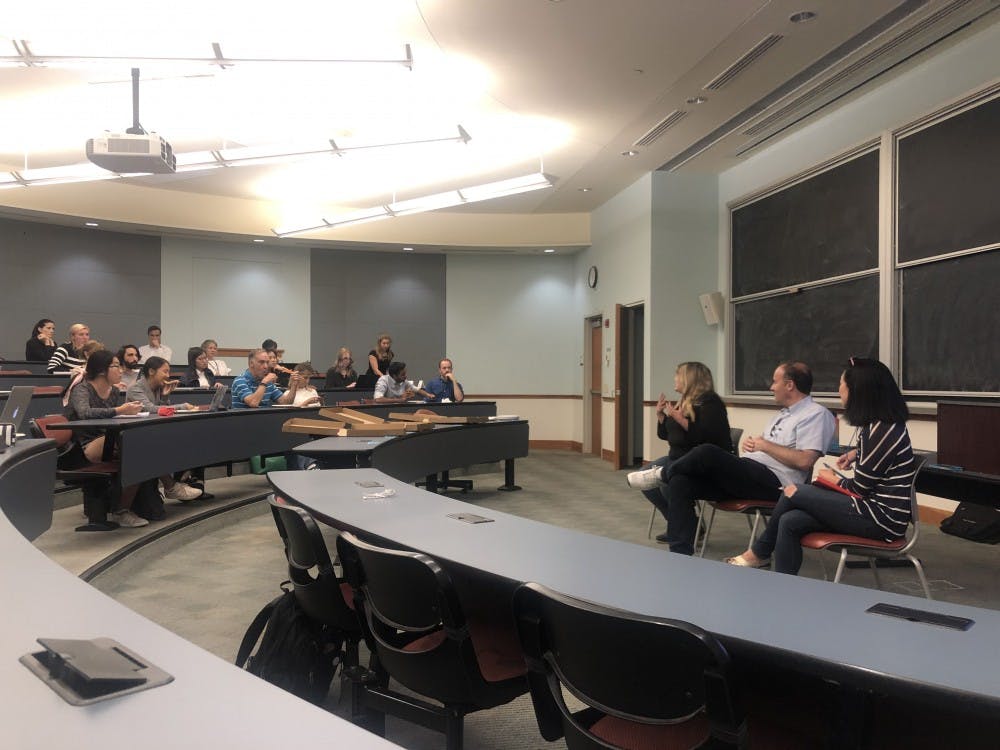The directors of the 21st Century Cities (21CC) Initiative, the Centers for Civic Impact and the Stavros Niarchos Foundation (SNF) Agora Institute discussed approaches to tackling climate change and other real-world issues at a talk titled “Passion to Action: Three Approaches to Tackling Climate Change” on the Homewood Campus on Monday, Oct. 7.
The directors of each of these organizations discussed various potential angles from which to look at the problem of climate change, including scientific Big Data analysis, economic impact measurement and political organization.
Beth Blauer is the executive director of the Centers for Civic Impact, an umbrella organization containing three Hopkins centers, which are focused on conducting applied public research, providing governmental and policy consulting services and training government officials in the use of Big Data tools.
Acknowledging that all three centers are relatively new on campus, Blauer began the event by stating that the event was an opportunity for students to learn about what they were working on in order to pique students’ interest in learning more about each center’s individual work.
Blauer said that they wanted to highlight the issue of climate change as it was a topic where there was a lot of intersection in the work of the three organizations.
“We each have pretty clear roles and ways that we think about the use of our particular capacities,” she said. “Each one of our centers represents an approach that is new and that is also different compared to many other University-led efforts.”
Director of the 21CC Initiative Matthew Kahn introduced 21CC and its climate-change initiative by discussing a recent scientific study. 21CC studies urban economic growth and quality of life, working with faculty to conduct research and develop policy.
Kahn stated that, according to this study, students that took the SAT on an extremely hot day scored lower on the SAT than students who took the test on a more temperate day.
“As people face this climate-change challenge, which is a very real one, how do we make sure that the poor don’t disproportionately bear the brunt of this?” Kahn asked.
Director of the SNF Agora Institute Hahrie Han began by introducing the institute and its role on campus. The SNF Agora Institute seeks to strengthen democratic institutions and improve civic engagement both on campus and on a larger scale.
Han asked the audience how many people were concerned about climate change, how many felt that the government was doing enough and how many of them had taken action before and felt like it had mattered.
Han then pointed out that many people had raised their hands to admit that climate change was a concern.
“A lot of what we’re trying to understand is how we strengthen the democratic process... so that people can solve the problems that they want to solve,” Han said.
Finally, Blauer introduced the Centers for Civic Impact by talking about an initiative they carried out in over 136 cities across the country in their first year.
“A lot of our cities identified the challenge of growth as it relates to both the sustainability of their policies but also the application of those policies and practices,” she said.
The speakers then took questions from the audience. One audience member asked whether the University should divest from all fossil fuels.
Kahn answered by asking a rhetorical question.
“If we take a moral stand, how much lower will our endowment be, and will our scientists not make a breakthrough?” he asked.
Han encouraged the audience to bring a wide range of opinions to the table and debate these issues with an open mind.
In an interview with The News-Letter, senior Ally Hardebeck said that she had previously interned at the Centers for Civic Impact and decided to attend the event because of her interest in climate change.
She said that she thought the three organizations present at the event were very important, as they represented a step forward for the University in prioritizing really important research on disciplines beyond the biological sciences.
“The conversation probably could have kept going for another hour based on the people who were trying to ask questions,” she said, “I liked that it was informal, but we really got through quite a variety of topics even within the large umbrella of climate change.”
Michael Albert, a first-year PhD student, said that this event was only scratching the surface of these questions.
“I study climate change and the politics of global crisis, and so I wanted to understand what people in other disciplines are doing, how they’re addressing it,” Albert said. “There were some stimulating possible avenues that were raised.”
Hardebeck said that she liked learning about the aspects of climate change research that were based more heavily in the social sciences.
“My own background has been so data-heavy and mostly policy, so I liked talking about the considerations of how do we change how people think about these issues and encourage civic participation,” Hardebeck said. “I think we could’ve talked more about the implications for Hopkins as a university and our investments.”
She added that events like these are beneficial to both the centers and the students attending them.
“I hope they do more in the future. Climate change is certainly not the only social issue that’s relevant to this conversation,” she said.





